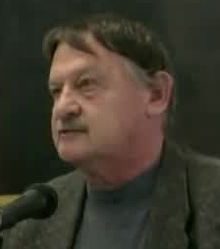Tine Hribar
This poorly sourced must be removed immediately from the article and its talk page, especially if potentially libelous. )Find sources: "Tine Hribar" – news · newspapers · books · scholar · JSTOR (January 2013) |

Tine Hribar (born 28 January 1941 as Velentin Hribar) is a
Life
He was born in the small village of
In 1987 Hribar was among the editors of the famous "
In 1992 Hribar became a professor at the University of Ljubljana again. In 1995 he became a member of the Slovenian Academy of Sciences and Arts.
Political commentator
Hribar's role in Slovenian public life after 1991 caused controversy. In the early 1990s he warned against the recurrence of
Between 2004 and 2008, Hribar was relatively supportive of the policies of Janša's government, especially the
After the parliamentary elections of 2008, which brought the left wing to power in Slovenia, Hribar adopted critical stance towards the Slovenian left, accusing it of abusing power for personal privileges.[1] He maintained a critical, but substantially favourable attitude towards the Slovenian secular right wing parties, especially to the Slovenian Democratic Party and its leader Janez Janša, whom he nevertheless accused of an excessively moralizing political discourse.[1]
Major works
- Človek in vera (Man and Faith), 1969.
- Molk besede (The Silence of the Word), 1970.
- Resnica o resnici (Truth about Truth), 1981.
- Metoda Marxovega Kapitala (The Method of Marx's Capital), 1983.
- Kopernikanski obrat (The Copernican Turn), 1984.
- Moč znanosti: marksistična teorija družboslovja (The Power of Science: the Marxist Theory of Social Sciences), 1985.
- Slovenska državnost (The Statehood of Slovenia), 1989.
- Uvod v etiko (Introduction to Ethics), 1991.
- Ontološka diferenca (The Ontological Difference), 1992.
- Fenomenologija 1 (Phenomenology, Vol. 1), 1993.
- Pustiti biti : kriza evropskega nihilizma (Letting Be: the Crisis of European Nihilism), 1994.
- Fenomenologija 2 (Phenomenology, Vol. 2), 1995.
- Slovenci kot nacija (Slovenians as a Nation), 1995.
- Evangelij po Nietzscheju (The Gospel According to Nietzsche), 2002.
- Dar biti (The Gift of Being), 2003.
- Evroslovenstvo (The Notion of a European Slovenia), 2004.
- Fenomenološki etos (The Phenomenological Ethos), 2009.
- Ena je groza (There is Only One Dread), 2010.
